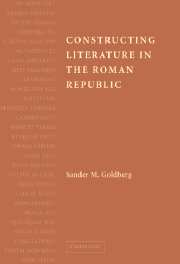6 - Roman Helicon
Published online by Cambridge University Press: 03 May 2010
Summary
Horace kept a long spoon for dining with augustus and might even refuse an invitation now and then, but a request he received toward the end of 13 B.C. could not be refused or evaded. While reading Horace's verse epistles, says Suetonius, the Princeps came to feel excluded from the emerging conversation, and so he grabbed his pen. “I want you to know,” he wrote the poet, “that I am cross with you because in all those writing of that kind you particularly avoid talking with me. Are you afraid that your reputation will suffer with posterity if you appear to be my friend?” Horace replied with the “Letter to Augustus” (Ep. 2.1) that we have already had reason to consider. So memorable, if not necessarily accurate, a medley of facts and opinions about Latin poetry is impossible for any exercise in Roman literary history to ignore. Horace's views of earlier writers, his narrative of Rome's literary development, and his complaints about the reception of modern poetry inevitably color our thinking on these subjects. Yet the letter is also deliberately and exuberantly incoherent. Its readers must cope, as Gordon Williams observed, with “all the easy movement of real conversation and a consequent difficulty in establishing precise logical relationships” (1968: 72). The letter thus avoids consistent argument and resists adequate summary. It also refuses to anchor its pronouncements in the bedrock of fact.
- Type
- Chapter
- Information
- Constructing Literature in the Roman Republic , pp. 178 - 203Publisher: Cambridge University PressPrint publication year: 2005

